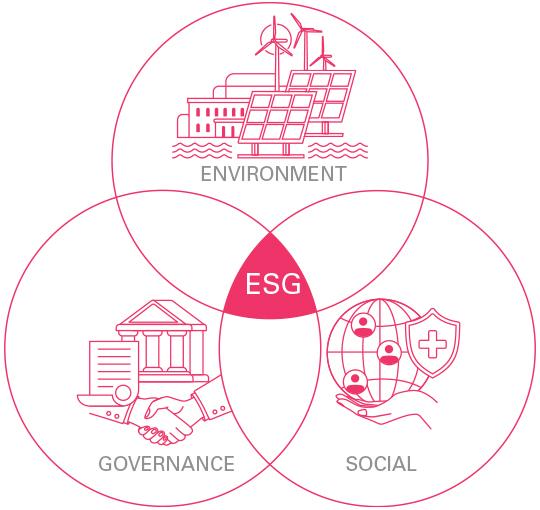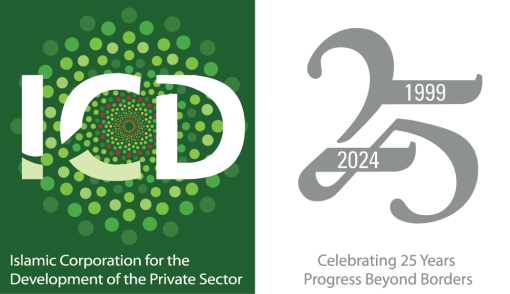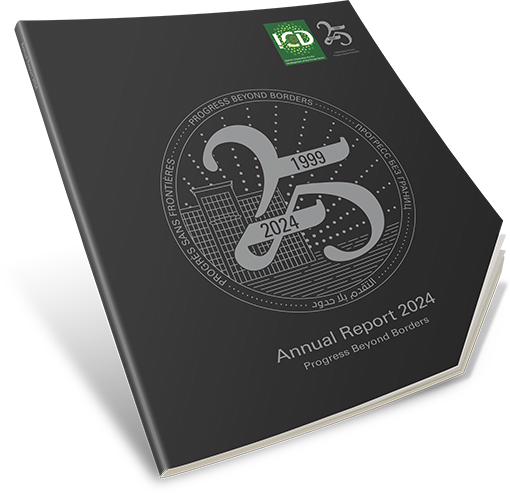Development Effectiveness (DE)
Strategic Innovations:
Advancing Development Effectiveness
Through these initiatives, ICD continues to drive innovation, sustainability, and development effectiveness, reinforcing its commitment to fostering impactful change in its member countries.
Launch of DART: A Tool for Developmental Impact Assessment
In January 2024, the Development Effectiveness Office (DEO) introduced the pilot phase of the Development Anticipation and Reporting Tool (DART). This tailored in-house solution allows ICD to assess its interventions through a developmental perspective. Integrated into the Due Diligence stage of the Development Indicators Monitoring System (DIMS) process, DART enhances transparency, efficiency, and effectiveness by assessing proposals submitted for the Investment Committee. Through scoring project proposals based on SDG alignment and expected outcomes, DART ensures that investments maximize developmental impact while maintaining sustainability.
Green Business Leadership: Championing Circular Economies
In April 2024, ICD partnered with the Circular Economy Company to sponsor the Green Business Workshop, aimed at advancing circular economies in Islamic member countries. Participants developed climate action roadmaps guided by the IsDB Just Transition Framework, gaining skills in market analysis, financial evaluation, and scenario planning. Key recommendations included expanding research initiatives, advocating for green finance policies, and fostering partnerships to drive sustainable business practices.
Driving Innovation: IsDB Group Startup Pitch Competition
The IsDB Group Startup Pitch Competition, held in April 2024, spotlighted innovative ventures across member countries, connecting entrepreneurs with investors and industry experts. Startups leveraged this platform to secure funding, validate their business models, and establish strategic partnerships. As ICD strengthens its role as a bridge between innovation and investment, the competition remains central to its strategy of accelerating sustainable development.
The competition on three broad thematic areas:
Fostering Sustainability: Internal ESG Awareness Program
In October 2024, ICD launched the Internal Sustainability and ESG Awareness Program to deepen understanding of sustainability concepts and ESG principles across the organization. This 12-month program integrates short video series, online and in-person workshops, and targeted communication strategies, creating a dynamic learning environment for employees. The initiative underscores ICD’s commitment to embedding sustainable practices in its operations and advancing ESG objectives, further aligning its activities with global sustainability standards.

Promoting Knowledge Sharing: Integrating SDGs into Corporate Strategy
The DEO continued to embed SDG targets within ICD’s operations by organizing workshops that applied the SAAU Framework (Stop, Adjust, Amplify, Undertake). These sessions fostered cross-departmental collaboration, identifying actionable improvements and charting a roadmap to support member countries’ SDG objectives. This initiative reinforced ICD’s role in aligning its strategies with global development priorities.
Evaluating for the Future: 6th IsDB Group Evaluation Symposium
In November 2024, ICD co-hosted the 6th IsDB Group Evaluation Symposium under the theme “Cherishing Learning and Charting the Future.” This event gathered global experts to discuss leveraging evaluation insights for strategic programming and risk management. Emphasizing data-driven decision-making and the integration of innovative monitoring and evaluation (M&E) technologies, the symposium highlighted the importance of informed strategies in achieving development outcomes.
Emphasizing data-driven decision-making and the integration of innovative monitoring and evaluation (M&E) technologies, the symposium highlighted the importance of informed strategies in achieving development outcomes.
Driving Climate Resilience:
ICD’s Leadership at COP29
In November 2024, ICD reaffirmed its commitment to global climate action at COP29 in Baku, Azerbaijan. Hosting the High-Level Climate Champions Dialogue, ICD convened policymakers, investors, and private sector leaders to tackle the challenges of implementing Nationally Determined Contributions (NDCs) under the Paris Agreement. This dialogue produced actionable strategies, fostering innovative solutions and collaborative frameworks to help member countries achieve their climate goals.
A standout event was ICD’s co-hosted panel on barriers and opportunities in accessing multilateral climate funds. The discussion spotlighted critical challenges, including complex application processes, limited technical capacity in developing countries, and inefficiencies stemming from overlapping funding structures. Proposed solutions encompassed streamlining fund access, bolstering capacity-building programs, and enhancing coordination among funding agencies to amplify impact. The panel also underscored the pivotal role of public-private partnerships (PPPs) in mobilizing private investments for climate initiatives. Successful case studies in renewable energy and sustainable infrastructure were showcased alongside recommendations to expand the use of innovative financial instruments, such as green bonds, sustainability-linked loans, and blended finance mechanisms. These discussions culminated in a roadmap for reforming multilateral climate funds, aiming for greater accessibility, efficiency, and scalability.
Looking forward, ICD is dedicated to turning these commitments into tangible actions by enhancing governance, strengthening capacity-building initiatives, and leveraging innovative financial tools. These efforts will drive the effective implementation of COP29 outcomes, cementing ICD’s role in advancing global climate resilience and sustainable development.
Building Momentum: ICD’s Early Climate Action at COP16
ICD’s journey in global climate advocacy began in December 2024 at COP16 in Riyadh, Saudi Arabia, where it aligned its strategies with the emerging climate agenda, emphasizing sustainable development in Islamic economies. Advocating for renewable energy, ICD championed early investments and fostered public-private collaboration. In partnership with the Islamic Development Bank (IsDB) Group, ICD conducted workshops to integrate climate considerations into national development plans and highlighted the transformative potential of Islamic finance—such as Sukuk—for supporting green initiatives.
This foundational engagement set the stage for ICD’s sustained leadership in climate resilience, establishing its position as a driving force in mobilizing resources and crafting sustainable strategies across its member countries.
2024 Development Effectiveness Survey Results
ICD conducts an annual survey to systematically collect data on the contributions of its clients and partners towards addressing the Sustainable Development Goals (SDGs) and to evaluate the specific developmental impacts they have made.
Note: The ICD Annual Development Effectiveness Survey included specific questions regarding the contribution of ICD-supported projects to the SDGs. Further information can be found in the 2024 Annual Development Effectiveness Report.







